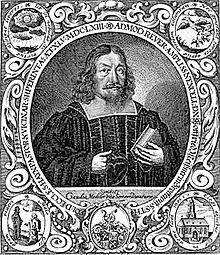Gottfried Meisner
Gottfried Meisner (also: Meißner ; born November 13, 1618 in Wittenberg ; † August 3, 1690 in Großenhain ) was a German Protestant theologian.
Life
Born as the son of Balthasar Meisner and his wife Magdalena (née Person), he experienced fatal events in his early youth. At the age of five he fell out of the window, at the age of seven he fell from the Wittenberg Bridge into the Elbe , lost his father at the age of eight, and at the age of nine stones broke in from the vault of the bathing room. Shaped by adverse circumstances, he got a sense of the life tasks ahead. Meisner's parents envisaged an academic career at an early age; on January 23, 1621 he was enrolled at the University of Wittenberg .
He received his first education from the private tutors Jakob Weller and Johann Sperling . At the Wittenberg Academy he began studying philosophy in 1633, which he completed on April 5, 1636 with the acquisition of the academic degree of a master's degree. Meisner originally wanted to continue his studies at the law faculty, but switched to the theological faculty a year later . On August 18, 1639, the skills he had acquired in the Hebrew language earned him a university permit for lectures as a Magister legens . After successfully lecturing, he was admitted to the Faculty of Philosophy as an adjunct on October 18, 1641 .
The events of the Thirty Years' War made him put aside his academic ambitions and devote himself entirely to the practical duties of a theologian. So he accepted an appointment as superintendent in Jessen on what he in Wittenberg on May 18, 1642 ordained was. Under Jakob Martini he was promoted on April 20, 1643 Wittenberg licentiate in theology and a doctorate on November 21, 1643 to the doctor of theology. The times of war harbored great dangers for the people of the time. In 1643 he was attacked by robbers who were trying to kill him while crossing the Elbe.
Since the situation in Jessen became more and more threatening for him, he went to Grossenhain as superintendent in 1644 , where he stayed for 46 years - until his death - and turned down other lucrative offers.
Meisner is said to have made a contribution to poor relief. He also appeared as a poet of sacred songs. These were relatively widespread. Since he acquired a considerable inherited fortune, Meisner bought the manors Uebigau and Brottewitz . His body was transferred to Uebigau and buried there.
family
Meisner was married three times. His first marriage was on June 28, 1642 in Wittenberg with Anna Maria, († April 27, 1657) daughter of Oschatz superintendent Johann Jentzsch (born January 2, 1585 in Mügeln; † January 17, 1662 in Oschatz) and his wife Magdalena (nee Steudler), a. After the death of his first wife, he concluded his second marriage on August 24, 1658, to Anna Barbara († May 24, 1680), the daughter of the town clerk and electoral tax collector in Oschatz Caspar Schober. After her death, he married Anna Catharina, the daughter of pastor Andreas Reinhardt in Senftenberg, in his third marriage on November 8, 1680. What is known about the children:
- Anna Sophia (born April 26, 1661 in Großenhain; † March 5, 1675 ibid)
- Anna Magdalena Meisner married Gerlach
- Anna Maria Meisner
- Johann Ludwig Meisner on Bottewitz
- Johann Gottfried September 22, 1649 immat. Wittenberg University as a minor; Mag.phil October 16, 1665
- an unknown daughter had married the teacher Johann Erdmann Camenz, the son of the provost of Schlieben Erdmann Gottfried Camenz.
Selection of works
Fonts
- De gubernatione Ecclesiae
- Discursum synodalem super consilio. Moguntio, de unione Papistico Luterana.
- Biblical Geographical Notes on the Song of Solomon, including the same spiritual interpretation. Hamburg 1687
- Petrinian belief phrase
- Lower but subsequently increased Esther. Hamburg 1687
- The heroine Judith. Hamburg 1687
- Peace joy. Grossenhain 1679
Songs
- Up, you children of God
- God my helper, I'm here at your feet
- Be faithful, O Christian Soul
literature
- lu: Meisner, Gottfried . In: Allgemeine Deutsche Biographie (ADB). Volume 21, Duncker & Humblot, Leipzig 1885, p. 243 f.
- Meisner, Gottfried. In: Johann Heinrich Zedler : Large complete universal lexicon of all sciences and arts . Volume 20, Leipzig 1739, column 371 f.
- Veronika Albrecht-Birkner : Pastors book of the church province of Saxony. Evangelische Verlagsanstalt, Leipzig, ISBN 978-3-374-02138-3 , Volume 6, p. 40
- Eduard Emil Koch : History of hymns and hymns of the Christian especially the German Protestant Church. Verlag Christian Belser, Stuttgart 1867, Volume 3, p. 363 ( GoogleBooks )
- Carl Wilh Hering: History of the city and Ephorie Grossenhain or the former Hainer care edited according to documentary information and in addition to the sermons held at the church jubilee celebrations in Hain in 1848, etc. Talk. R. Borneman, Großenhain / Oederan 1849
- Johann Christoph Erdmann: Biographies and literary messages from the Wittenberg theologians. Wittenberg 1804
Web link
Individual evidence
- ^ Bernhard Weissenborn: Album Academiae Vitebergensis. Younger Series Part 1 (1602–1660). Magdeburg 1934
- ↑ Gottfried Suevo: Academieae Wittebergensis from anno fundationes 1502…. Usque ad annum 1655. Wittenberg 1655
- ^ Gustav Früh, Hans Goedeke, Hans Jürgen von Wilckens: The funeral sermons of the Braunschweig city archive. Lower Saxony State Association for Family Studies e. V., Hannover 1976, Volume 5, p. 2510
- ^ Fritz Roth : Complete evaluations of funeral sermons and personal documents for genealogical and cultural-historical purposes. Volume 7, p. 50
| personal data | |
|---|---|
| SURNAME | Meisner, Gottfried |
| ALTERNATIVE NAMES | Meissner, Gottfried |
| BRIEF DESCRIPTION | German Protestant theologian |
| DATE OF BIRTH | November 13, 1618 |
| PLACE OF BIRTH | Wittenberg |
| DATE OF DEATH | August 3, 1690 |
| Place of death | Grossenhain |
